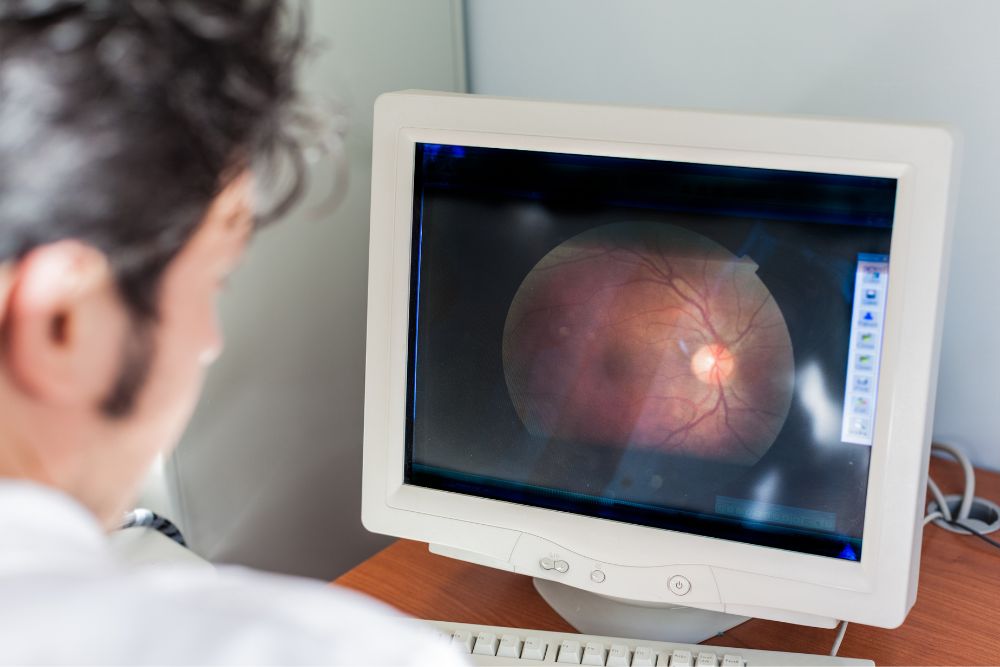Through the Lens: An Overview of Modern Retinal Diagnostics

The retina and its related parts are susceptible to many disorders. Should any concerns or symptoms arise, a retina specialist can promptly diagnose you using advanced diagnostic technologies and methods, enabling them to create and initiate a treatment plan at the earliest opportunity. At Retina Group of Florida, each of our retina centers is equipped with state-of-the-art technologies for quick and accurate retinal diagnostic testing.
What To Expect in a Retinal Diagnostic Exam
The American Optometric Association (AOA) recommends anyone 18-64 without existing conditions have a comprehensive dilated eye exam at least every two years, or annually, if 65 and over. Besides affording a full overview of your general eye and vision health, it’s the only method to detect potential retinal conditions and delay their progression. Eye dilation involves administering special eye drops to temporarily widen your pupil, allowing for a clear view of the back of the eye and the retina. When you see a retina specialist for a diagnostic assessment, you’ll undergo a comprehensive eye exam, including dilation, as well as retinal imaging. At the end of the exam, your retina doctor will discuss their findings with you and may schedule a follow-up exam to monitor any eye changes.
Retinal Imaging Techniques for Diagnostic Testing
Imaging techniques play a critical role in retinal diagnostic testing. These procedures help retina specialists see exactly what’s going on inside your eye.
Fluorescein angiography and indocyanine green (ICG) angiography
These imaging tests are used to view the retina and choroid, which is a spongy, pigmented layer of blood vessels and connective tissue supplying the retina’s outer layers with oxygenated blood. Fluorescein angiography and ICG both enable retina specialists to observe vital details about the retinal vascular system that would be otherwise impossible to see.
Both tests involve small amounts of fluorescent, non-radioactive, colored dyes being injected into an arm vein and then traveling to the eye’s blood vessels. Special cameras capture photographs (not X-rays) to reveal the presence of any retinal abnormalities in these vessels.
Angiography helps diagnose and monitor multiple retinal diseases, including age-related macular degeneration (AMD), diabetic retinopathy, and retinal vascular occlusions. Fluorescein angiography is better at examining retinal blood vessels, while ICG is preferred for the evaluation of choroidal blood vessels, as they’re typically deeper and harder to see. Unlike Fluorescein dye, ICG dye also illuminates when exposed to infrared light, providing a clearer view of retinal blood vessels. Lastly, angiography is also commonly used in laser surgery, helping to guide and monitor the process.
Angiography has few side effects, which may include a burning sensation as the dye enters the bloodstream (which goes away after a few seconds), temporary skin and urine discoloration, nausea, and blurry vision. These side effects typically wear off within a few hours. Rarely, you may experience an allergic reaction to either dye, resulting in a skin rash, itchy skin, or breathing difficulty, which may be treated with oral or injectable antihistamines.
Optical coherence tomography (OCT)
This non-contact, non-invasive imaging technique enables retina specialists to obtain high-resolution, cross-sectional retinal images, all highly detailed, clear, and accurate. OCT works by scattering infrared light waves to quickly scan the eye, like computed tomography (CT), which scans internal organs.
OCT is used in the early detection and treatment of conditions such as macular holes, macular edema, AMD, and diabetic retinopathy. It can also measure the thickness of retinal nerve fiber layers, making it effective for diagnosing diseases of the optic nerve, like glaucoma.
Schedule a Retinal Diagnostic Testing Exam in Florida
Regular retinal diagnostic exams, including fluorescein angiography, indocyanine green angiography, and optical coherence tomography, are essential for early detection and effective treatment of various eye conditions. These advanced imaging techniques provide vital insights, ensuring comprehensive care and monitoring. To schedule a comprehensive retinal exam in Florida, contact Retina Group of Florida today.


